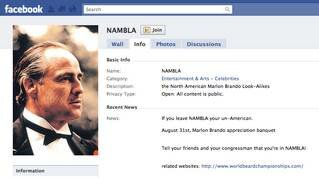 Facebook offers a wide assortment of NAMBLA groups your prankster "friends" can add you to.
Facebook offers a wide assortment of NAMBLA groups your prankster "friends" can add you to.
Facebook's 500-million-strong user base was built on the power of weak social ties; "friendship" got defined down significantly to include "anyone I've interacted with." But Facebook's new group feature lets all those low-bar friends decide what groups you are in. The blowback has been immediate, and in a twist, involves Facebook's Mark Zuckerberg.
Area resident Michael Arrington, upon discovering that he had been added to a joke NAMBLA group, added Zuckerberg as well. As a squeaky-clean new AOL employee, Arrington naturally wants this cleared up as soon as possible, so a little fuel was added to the fire. This is possible because since only "friends" can add you to groups, there is no query to you for confirmation. (Ironically, Zuckerberg pitched groups as offering Facebook members "more control.")
Meanwhile, Seattle's Health Month inventor, Buster Benson, made the rueful discovery today that any potential competitor of yours can claim intellectual property infringement, and Facebook will take down your page immediately without checking with you, or offering recourse. (Lifehacker explains what Health Month is all about here.) Benson has since discovered that the person who complained to Facebook about the "infringement" can be found in the comments section of various Health Month mentions online, remarking anonymously on the superiority of his product. [UPDATE 10/12/10: Benson reports his page has reappeared.]
On the plus side, perhaps even now Facebook ads are recommending local legal services.
Will it never end? This morning's New York Times brings news of the latest salvo in the long-running battle between the co-founders of the popular Baby Einstein series, William Clark and Julie Aigner-Clark, and the University of Washington. The Clarks are now suing the UW for records related to two studies in 2004 and 2007, where researchers Frederick Zimmerman and Dr. Dimitri Christakis seemed to confirm that, as SunBreak photo editor James Callan put it in Seattlest at the time, the videos were nothing more than "21st century snake oil," with no demonstrable educational impact on children--while subjecting them to the potentially harmful effects of TV.
The Clarks sold Baby Einstein to the Walt Disney Company back in 2001, and at one point the brand was generating $200 million in sales and controlled 90 percent of the booming baby edutainment market. The problem was that for years, pediatricians had been discouraging parents from letting infants watch any television, to the point that in 1999, the American Academy of Pediatrics issued a formal recommendation that children under the age of two (Baby Einstein's target market) shouldn't be watching any television....

Most Recent Comments